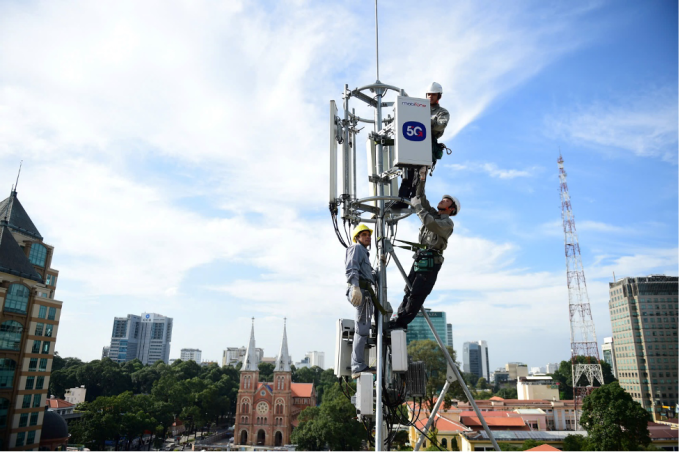Widespread 5G network, additional undersea fiber optic cables, tightening OTT management, and the Digital Technology Industry Law are changes to the technology industry in 2025.

After 2024, with many strategies and decrees being issued, along with a number of technology-related draft laws being developed, 2025 is expected to continue to see many positive changes for the technology sector in Vietnam.
5G network coverage
According to the digital infrastructure strategy until 2025, Vietnam aims for 100% of provinces, cities, high-tech zones, concentrated information technology zones, research and development centers, innovation centers, industrial parks, stations, and airports to have 5G services.
In fact, after being deployed since October 2024, Viettel and VNPT's 5G has been present in 63 provinces and cities, but the coverage in remote provinces is still low, mainly in the central area. The carriers have not revealed how many more stations they will install, but all said they will continue to expand their coverage. In addition, the third carrier, MobiFone, will also provide 5G coverage this year. According to regulations, within two years after the successful frequency auction, businesses must deploy at least 3,000 5G broadcasting stations.
The 700 MHz frequency will be auctioned in early 2025. If successful, this will become an important frequency for 5G expansion thanks to the coverage per base station being many times higher than the current 2500-2600 and 3700-3800 MHz frequencies.
More submarine fiber optic cables in operation
From the end of 2024, the ADC route with the main axis following the Singapore - Hong Kong - Japan route will start operating, with the participation of Viettel. The network operator said that customers can use the service in early 2025. ADC has a design capacity of 20 Tbps, making it the largest submarine optical cable operating in Vietnam, double that of the previous largest route, AAE-1.
In its Digital Infrastructure Strategy, Vietnam aims to put at least two new submarine cable lines into operation by 2025. In addition to ADC, another line, SJC-2, is also expected to be operational soon, helping to expand transmission capacity while minimizing risks to Internet connections when a line has problems.
Declare registration name when using OTT

Decree 163 on the implementation of the Telecommunications Law issued late last year, which regulates the management of data center services, cloud computing, and basic telecommunications services on the Internet, will take effect from January 2025.
OTT messaging applications that provide the ability to send, transmit, and receive information between two or more users of telecommunications services on the Internet are classified in this group. Under the new regulations, users must provide at least their registered name, mobile phone number, or other identification information if they do not use a phone number. Service providers are responsible for authenticating users via mobile phone number or identification information before providing the service.
Previously, Decree 147 on management, provision, and use of the Internet and online information also required social network users and online gamers to authenticate their accounts using their mobile phone numbers. The Decree takes effect from December 25, 2024, but allows social networks to prepare within 90 days, meaning the deadline for implementation is March 25.
Digital Technology Industry Law
The Digital Technology Industry Bill was submitted to the National Assembly last year and is being finalized for possible passage this year. The law is expected to promote the digital technology industry to make a major contribution to the economy, while Vietnam can become a favorable environment for the development of digital technology businesses.
According to the draft, businesses participating in this field may receive partial funding support and tax incentives. In addition, the draft law also proposes a mechanism for testing digital technology products and services, which is considered one of the breakthrough policies. Accordingly, products and services that converge digital technology and new business models that have not yet been regulated will be allowed to be tested under control.
The bill also has a separate chapter on the most influential fields today such as the semiconductor industry and artificial intelligence. In particular, the semiconductor industry is identified as an important activity in the digital technology industry, thereby providing regulations on principles, classification of activities, mechanisms, and specific policies, giving priority to semiconductor development. Artificial intelligence is also considered a core digital technology, widely applied in all fields, so it will be managed to limit risks and at the same time make good use of the benefits that AI brings.
HQ (according to VnExpress)